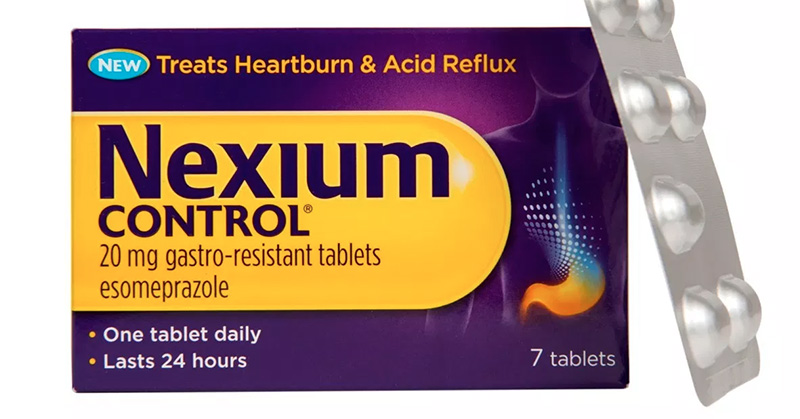Editor’s Note: This article was originally published in September 2019 and has since been updated.
Heartburn medications, called proton pump inhibitors (PPIs), may increase the risk of early death, according to research [1].
Over-the-counter (OTC), as well as prescription medications for heartburn, may increase the risk of heart disease, stomach cancer, and kidney dysfunction, among other health issues. The research notes that a person’s risk increases the longer they take the drug, even at low doses.
Examples of these drugs include Nexium, Prilosec, Protonix, and Prevacid. The results showed that for every 1,000 people, 45 excess deaths were attributed to long-term PPI use. A 17 percent increased risk of death in the PPI group was observed.
What do these results mean for people who take heartburn medication? And what can you do if you suffer from chronic heartburn? Let’s discuss.
How Many People Have Heartburn and What Causes It?
Heartburn is very common and heartburn drugs are some of the most commonly used drugs in the United States, with up to 10 percent of adults taking medication for the issue [2]. Up to 60 percent of people will experience symptoms of gastroesophageal reflux disease (GERD) at some point in the next year [3].
GERD is commonly referred to as acid reflux and is caused by stomach acid coming up into your esophagus. If this happens only occasionally, it’s usually referred to as just heartburn, but if it’s chronic, it’s more likely to be diagnosed as GERD [4].
Some people get heartburn as a result of certain foods or drinks (think spicy foods or alcohol), while others are predisposed to develop the condition due to other factors such as smoking or being overweight. Heartburn can also be the result of pregnancy or stress [5]. There are even some medications known to cause heartburn [6].
Low-Dose, Long-Term Use of Heartburn Medications “Not Safe”
The research showed evidence that prescription-strength heartburn medications aren’t the only ones that increase the risk for these serious health conditions—even OTC medications in low doses appear to be problematic.
What’s interesting is that the study noted that many people (more than half in the study) don’t even really need these medications, although the authors didn’t note why these subjects had been prescribed such drugs. Even more interesting is that deaths related to PPI use were higher in people who took PPIs without a medical need to do so [1].
The lead researcher of the study, Dr. Ziyad Al-Aly, claims that use of these medications should be restricted and that they are contributing to thousands of deaths every year. He also claims that they shouldn’t be used for more than 14 days and that taking them over a period of months or years—even at low doses—simply isn’t safe.
How Heartburn Drugs Work
Heartburn drugs typically come in two categories: antacids, which neutralize stomach acid to help alleviate heartburn, and acid blockers, which reduce the actual production of stomach acid. Both of these are available as prescriptions or OTC.
Some physicians will prescribe both of these together, as antacids can help control symptoms of heartburn until the acid blockers have time to work [7].
The relationship between heart disease, stomach cancer, kidney issues, and heartburn drugs is not clear from the study; the research doesn’t prove that heartburn drugs cause early death, just that there is an association that’s not yet understood.
What Health Conditions Have They Been Linked to?
This isn’t the first time heartburn drugs have been linked to health problems. Previous research has linked these medications to other health conditions such as dementia, pneumonia, and even bone fractures [8], [9].
Since heartburn medications interfere with stomach acid, they may impact the body’s ability to absorb calcium, which may lead to weaker bones and an increased risk of fractures.
Why heartburn drugs have been linked to cognitive decline isn’t clear, although some researchers speculate that a possible reduction in vitamin B12—presumably from the drugs’ effect on stomach acid—could make the brain more susceptible to damage [8].
In pneumonia research, PPIs were associated with an increased risk of pneumonia in people aged 60 and older. Researchers speculate that this is because stomach acid helps prevent infections from the gut in some people [9].
The most recent research says that PPIs double one’s risk of stomach cancer even after the elimination of Helicobacter pylori (H. pylori), a bacteria that is a known risk factor for stomach cancer [11]. Evidence also associated PPI use with heart disease and chronic kidney disease, and an overall increased risk of death as the result of these conditions [1].
How to Stop Heartburn Naturally
Although you should always follow your professional healthcare provider’s guidance and never stop taking your medication without first consulting your doctor, many people on heartburn medication are going to wonder what they can do after reading this research.
People who suffer from occasional heartburn or GERD need a way to prevent stomach acid from damaging their esophagus. Heartburn isn’t only painful: harsh stomach acids have the potential to damage the esophagus and even lead to an increased risk of esophageal cancer [12].
In addition, stomach acids can travel up the esophagus and into the oral cavity, wreaking havoc on tooth enamel and leading to an increased risk for cavities and sensitive teeth [13].
So, what can you do to help stop heartburn naturally?
- Don’t eat huge meals. Eat smaller, more frequent meals throughout the day to help control your body’s natural production of stomach acid. Plus, eating smaller meals more often has been shown to be beneficial for your metabolism [14]
- Lose weight. If you’re overweight, this is a risk factor for heartburn. By shedding pounds, you might just be able to help alleviate painful symptoms of GERD.
- Don’t lie down after a meal. This will encourage stomach acid to come up into your esophagus, so keep upright after a meal. Some patients even find it helpful to sleep in an elevated position as well.
- Try ginger. I adore ginger and it’s helped me with some serious health issues [15]. Ginger is known for helping stomach issues including indigestion and gastritis [16]. Try taking ginger capsules, drinking ginger tea, or using fresh ginger root in your meals.
- Drink baking soda. Yes, it’s gross, but it might help. This is only to be used as a temporary (approximately one week) solution to heartburn. Try one teaspoon of baking soda in eight ounces of water, drink all of it to help neutralize stomach acid. Don’t exceed seven doses per day [17].
Some other helpful tips include eating a ripe banana daily to reduce acid discomfort, eating an apple a few hours before bed, and trying chamomile tea about an hour before bed [17].
In light of this new research, in addition to previous research on the effects of heartburn drugs, it’s becoming clearer that we need to find other solutions to handling occasional and chronic health issues such as heartburn.
If you’re on prescription-strength or even a low dose of daily heartburn medication, speak to your doctor before stopping any medication.
Sources
- “Heartburn drugs linked to fatal heart and kidney disease, stomach cancer.” WUSTL. Kristina Sauerwein. May 30, 2019
- “Common acid reflux medications linked to increased kidney disease risk.” Science Daily. University of California – San Diego. February 19, 2019.
- “Gastroesophageal Reflux Disease (GERD) Hospitalizations in 1998 and 2005.” HCUP. January 2008.
- “Acid Reflux (GER & GERD) in Adults.” NIH
- “Gastroesophageal reflux disease (GERD).” Mayo Clinic
- “Heartburn.” Medline Plus
- “Heartburn.” Cleveland Clinic
- “Studies Link Some Stomach Drugs to Possible Alzheimer’s Disease and Kidney Problems.” Scientific American. Karen Weintraub. February 2017.
- “Heartburn drugs linked to pneumonia in older people.” UPI. Allen Cone. April 25, 2018.
- “GERD, Barrett’s Esophagus and the Risk for Esophageal Cancer.” ASGE
- “Tooth Erosion and Acid Reflux.” Mouth Healthy
- “Small, Frequent Meals are Better for Your Metabolism.” Duke Health. Sheena Faherty. December 16, 2014.
- “A review of the gastroprotective effects of ginger (Zingiber officinale Roscoe).” NCBI. Raghavendra Haniadka, Elroy Saldanha, Venkatesh Sunita, Princy L Palatty, Raja Fayad and Manjeshwar Shrinath Baliga. June 2013.

